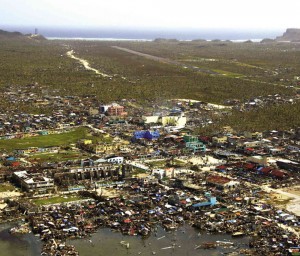After watching so much misery in the news he could not help feeling the need to do something a bit more than just watch the news. And when it was suggested they bring the children to help repack relief goods he decided to come along. The easiest repacking center to go to was at Casa Gorordo. The Ramon Aboitiz Foundation, Inc. was repacking relief goods for northern Cebu that Sunday.
It was his first time. He thought he might have a problem fitting in and making himself useful. But when he got there he found many friends. The team doing the repacking were mostly young people, students from various schools, and children. He came across a group repacking sugar from large sacks into smaller plastic bags. He asked how he could help. They put him into the team. All he had to do was hold the plastic bag so someone could pour sugar into it with a plastic can. It was easy but tedious repetitive work. But he is a wood carver when he is not something else and so it was work he was used to. Carving requires making little cuts to produce a final big result.
As he soon happily discovered, the people in this team were all students from the school where he teaches. They had come here on their own much for the same reasons he and his family are here. The small plastic bags are always tricky to open. So he assigned his youngest child to do that for him. His little fingers were ideal for the job and soon the repacking team was moving along quite quickly producing a small pile of bags on a plastic table. A young lady did the work of closing the bags. Another young person counted and placed them into carton boxes.
The boxes went to another repacking group who placed the bags into “sando” bags already filled with packs of noodles, small bags of powdered milk, rice, some canned goods and soap. These bags were loaded into still bigger bags ready for loading into a truck-van. The trucks left as soon as they were filled.
But in due course, his youngest son complained of thirst and how his arms had become all sticky from bits of sugar which clung to his skin. He had the additional job of picking out whatever small amounts of sugar were left in the sack that could not be reached with the big can. He had a small plastic cup to do this. But he had obviously become tired and bored from doing work whose importance he did not fully understand.
And so the father explained how the bags will feed all those typhoon victims they saw on TV. Most of them have become homeless now. The stores where they usually bought food would be closed. They would have nothing to eat. Receiving these small bags of food could mean the difference between life and death for them.
The young child nodded his head. And yet the father wondered if he fully understood all these. These are things easy to put into rational words. And yet at a certain point, one sees how insufficient the words are to contain all that the winds of Yolanda brought with them.
Villages were practically wiped out and erased. The television showed before and after pictures to show exactly how. The footage of the typhoon itself had been quite dramatic. More than anything else, they showed how the reporters were themselves lucky to have survived the ordeal. This was reality TV as we have never seen before, taken at great personal risk to the teams that took them. Besides showing on video the great adventure of life the footage have immense practical importance. They will certainly draw the attention and interests of viewers the world over. As they were being shown, pledges of assistance for the victims came from everywhere.
But there is still the problem of ensuring the delivery of aid to where they are most needed. The news told of a breakdown of law and order in Tacloban itself. There was obviously still much that needed to be done. And yet, everything starts from doing little things. Small contributions and small work from small people who simply want to do more than just watch. Hopefully, they will be enough to do the big work of setting things right after Yolanda.


